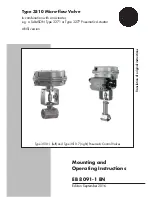
53
NanoTrak Autoalignment Controller
E.1.3
Circle Size and Gain Control
Given that movement of two opposing fibers produces variations in the coupled
power, the very act of automatically aligning the fibers to increase the coupled power
may cause unwanted disturbances to the signal path.
Consider the optical profile in Fig. E.5. When the NanoTrak is tracking, the polarity of
the resultant control voltage is determined by the position of the aligning fiber relative
to the center line and the voltage amplitude is proportional to the amount of
displacement from this center line.
Fig. E.5 Circle diameter
If the scan circle diameter ‘d’ is such that the circle crosses the center line, the polarity
of the control voltage is reversed and movement of the circle becomes erratic. The
ideal circle size is dependant upon the shape and dimensions of the optical curve
associated with a particular application, but should be between
1
/
10
and
1
/
20
FWHM
(full width half maximum).
Under normal operation, the circle size should be reduced in proportion to the coupled
signal, from a maximum of 3 µm to a value of less than 50nm. At the point of optimized
alignment, this small modulating signal results in a small a.c. component, sufficient to
maintain tracking but low enough to ensure that the resultant modulation does not
interfere with the measurement being made.
The circle size can be set manually by calling the SetCircDia method or entering a
value in the Settings panel. Alternatively, if automatic LUT diameter adjustment mode
is enabled (using the SetCircDiaMode method), the system uses values in a LUT to
modify circle diameter in relation to the input range currently selected.
This LUT diameter adjustment mode allows appropriate circle diameters to be applied
on an application specific basis.
coupled power
fiber displacement
50%
FWHM
d












































